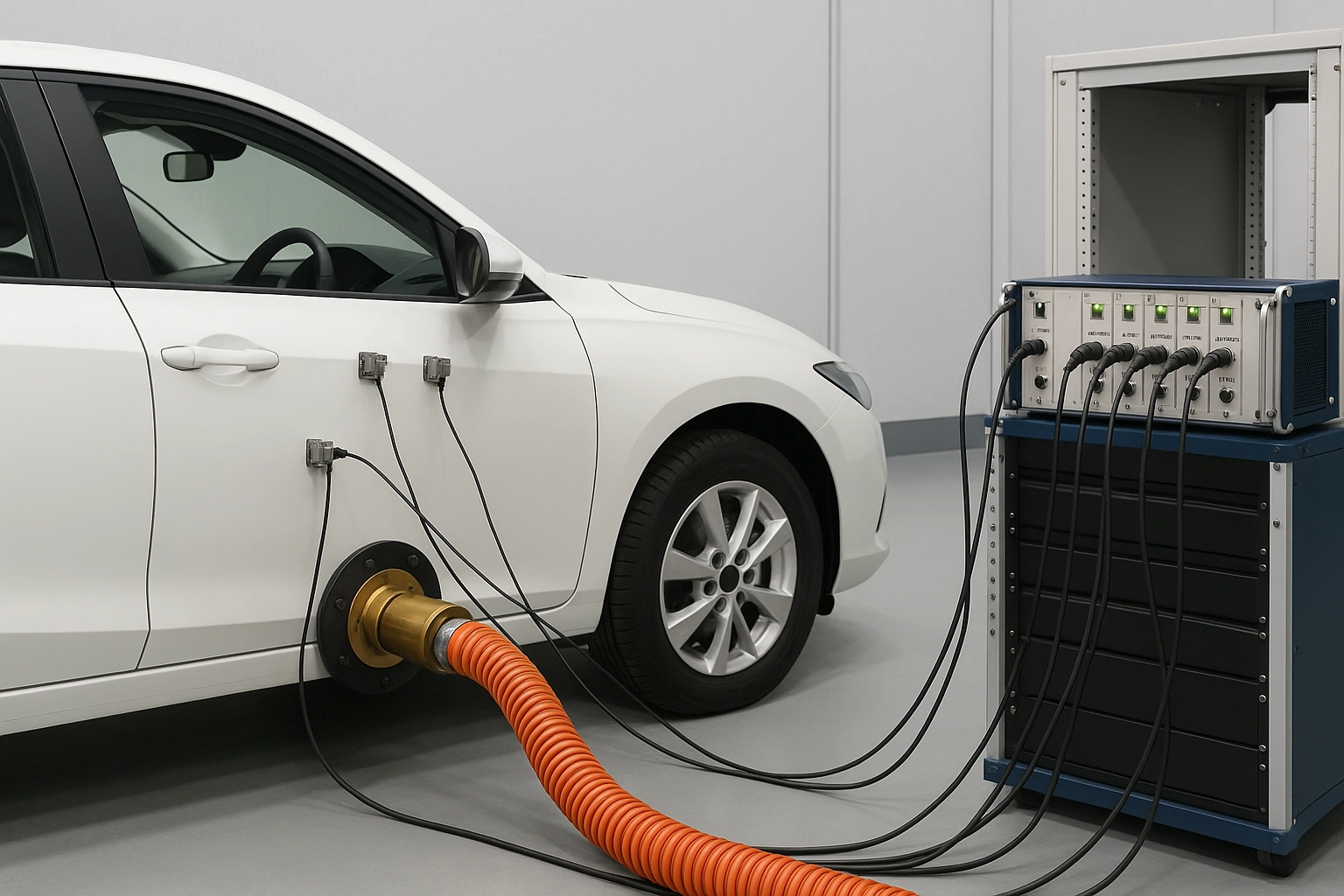JIS K7110 Plastic Component NVH Sound Testing
The JIS K7110 sound testing standard is a crucial component of ensuring that automotive plastic components meet the stringent noise, vibration, and harshness (NVH) requirements. This test evaluates the acoustic properties of plastic parts used in vehicles to ensure they contribute positively to an optimal NVH environment. Automotive interiors are increasingly focusing on reducing noise levels and improving comfort for passengers, which is why this standard plays a vital role.
The JIS K7110 testing procedure involves placing the plastic component into a specially designed chamber where it is subjected to controlled sound pressure levels across a range of frequencies. The test aims to measure how the material responds acoustically under these conditions. This helps in identifying any resonant frequencies that could lead to unwanted noise or vibrations, which are critical considerations for automotive design.
The testing process begins with the preparation of the specimen according to the specified dimensions and tolerances defined by JIS K7110. The sample is then mounted on a mounting fixture designed to simulate real-world conditions as closely as possible. Once in place, the test chamber is sealed to prevent any external noise interference. The sound pressure levels are then applied using an electro-acoustic transducer, which generates controlled frequency sweeps across the audible range.
During testing, the acoustic properties of the plastic component are monitored by a high-resolution microphone positioned near the specimen. The data collected includes both time-domain and frequency-domain measurements, providing a comprehensive picture of how the material behaves under various sound pressure levels. This detailed analysis allows for precise identification of any potential issues with the NVH performance of the component.
The results from this testing are compared against the specified acceptance criteria outlined in JIS K7110 to determine compliance. Compliance ensures that the plastic component meets the necessary standards, contributing effectively to the overall NVH characteristics of the vehicle. Non-compliance could indicate a design flaw or material property issue that needs addressing before mass production.
Compliance with JIS K7110 is essential for manufacturers aiming to meet international quality and safety standards. It ensures that automotive components are designed and manufactured to minimize noise pollution, enhance passenger comfort, and improve the overall driving experience. This standard also supports continuous improvement in material selection and design, leading to more advanced and efficient vehicles.
Our laboratory offers state-of-the-art facilities equipped with precision instruments capable of conducting JIS K7110 sound testing accurately and reliably. Our team of experts ensures that each test adheres strictly to the specified standards, providing accurate results essential for quality assurance in automotive manufacturing.
Industry Applications
The automotive industry places significant emphasis on NVH performance as it directly impacts customer satisfaction and vehicle safety. JIS K7110 sound testing is particularly relevant to the design and production of various components within this sector, including:
- Interior panels
- Pedal assemblies
- Seating systems
- Air conditioning ducts
- Hood and trunk covers
These components, when subjected to JIS K7110 testing, help in identifying potential issues that could lead to noise generation or vibration, thereby ensuring a more comfortable driving experience. The test is also valuable for manufacturers looking to comply with international standards and improve their product quality.
Quality and Reliability Assurance
The JIS K7110 sound testing standard plays an integral role in the quality control process of automotive components. It helps in maintaining high standards of material performance, ensuring that each part contributes to a harmonious NVH environment within the vehicle.
By adhering to this standard during production, manufacturers can identify and rectify any issues early on, preventing costly rework or recall situations later down the line. This proactive approach not only enhances product reliability but also boosts brand reputation, as consistent adherence to international standards is highly valued by consumers.
The detailed nature of JIS K7110 testing ensures that each component undergoes thorough scrutiny before being integrated into a vehicle assembly. The results provide actionable insights for continuous improvement in design and material selection. This commitment to quality assurance reflects the automotive industry’s dedication to delivering superior products that meet global expectations.
Our laboratory provides comprehensive support throughout this process, offering expert guidance on specimen preparation, testing protocols, and interpretation of results. With our advanced facilities and experienced staff, we ensure every test aligns with JIS K7110 standards, providing reliable data for informed decision-making in product development.
Use Cases and Application Examples
The JIS K7110 sound testing process is particularly useful in the following scenarios within the automotive industry:
- New Product Development: Early-stage product evaluation ensures that new components meet NVH standards before full-scale production.
- Quality Control: Periodic testing helps in maintaining consistent quality across all manufactured parts.
- R&D Projects: Advanced research projects benefit from detailed acoustic data to refine and optimize component designs.
- Supplier Audits: Third-party suppliers undergo rigorous evaluation to ensure they meet the required standards for their components.
In a real-world example, a leading automotive manufacturer conducted JIS K7110 sound testing on a new dashboard panel. The results indicated that the initial design had higher than acceptable noise levels at certain frequencies. Based on these findings, modifications were made to the material and manufacturing process, resulting in an improved product that met all NVH requirements.
Another instance involved a supplier undergoing periodic audits using JIS K7110 testing for their air conditioning ducts. The test revealed slight deviations from the standard, prompting the supplier to implement corrective measures immediately. This proactive approach ensured compliance and maintained high standards throughout the supply chain.





